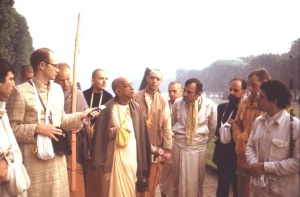SB 6.3.22: Difference between revisions
No edit summary |
(Vanibot #0054 edit - transform synonyms into clickable links, which search similar occurrences) |
||
| Line 23: | Line 23: | ||
<div class="synonyms"> | <div class="synonyms"> | ||
''etāvān'' | ''[//vanipedia.org/wiki/Special:VaniSearch?s=etāvān&tab=syno_o&ds=1 etāvān]'' — this much; ''[//vanipedia.org/wiki/Special:VaniSearch?s=eva&tab=syno_o&ds=1 eva]'' — indeed; ''[//vanipedia.org/wiki/Special:VaniSearch?s=loke&tab=syno_o&ds=1 loke] [//vanipedia.org/wiki/Special:VaniSearch?s=asmin&tab=syno_o&ds=1 asmin]'' — in this material world; ''[//vanipedia.org/wiki/Special:VaniSearch?s=puṁsām&tab=syno_o&ds=1 puṁsām]'' — of the living entities; ''[//vanipedia.org/wiki/Special:VaniSearch?s=dharmaḥ&tab=syno_o&ds=1 dharmaḥ]'' — the religious principles; ''[//vanipedia.org/wiki/Special:VaniSearch?s=paraḥ&tab=syno_o&ds=1 paraḥ]'' — transcendental; ''[//vanipedia.org/wiki/Special:VaniSearch?s=smṛtaḥ&tab=syno_o&ds=1 smṛtaḥ]'' — recognized; ''[//vanipedia.org/wiki/Special:VaniSearch?s=bhakti&tab=syno_o&ds=1 bhakti]-[//vanipedia.org/wiki/Special:VaniSearch?s=yogaḥ&tab=syno_o&ds=1 yogaḥ]'' — ''bhakti-yoga'', or devotional service; ''[//vanipedia.org/wiki/Special:VaniSearch?s=bhagavati&tab=syno_o&ds=1 bhagavati]'' — to the Supreme Personality of Godhead (not to the demigods); ''[//vanipedia.org/wiki/Special:VaniSearch?s=tat&tab=syno_o&ds=1 tat]'' — His; ''[//vanipedia.org/wiki/Special:VaniSearch?s=nāma&tab=syno_o&ds=1 nāma]'' — of the holy name; ''[//vanipedia.org/wiki/Special:VaniSearch?s=grahaṇa&tab=syno_o&ds=1 grahaṇa]-[//vanipedia.org/wiki/Special:VaniSearch?s=ādibhiḥ&tab=syno_o&ds=1 ādibhiḥ]'' — beginning with chanting. | ||
</div> | </div> | ||
Latest revision as of 22:39, 18 February 2024

A.C. Bhaktivedanta Swami Prabhupada
TEXT 22
- etāvān eva loke 'smin
- puṁsāṁ dharmaḥ paraḥ smṛtaḥ
- bhakti-yogo bhagavati
- tan-nāma-grahaṇādibhiḥ
SYNONYMS
etāvān — this much; eva — indeed; loke asmin — in this material world; puṁsām — of the living entities; dharmaḥ — the religious principles; paraḥ — transcendental; smṛtaḥ — recognized; bhakti-yogaḥ — bhakti-yoga, or devotional service; bhagavati — to the Supreme Personality of Godhead (not to the demigods); tat — His; nāma — of the holy name; grahaṇa-ādibhiḥ — beginning with chanting.
TRANSLATION
Devotional service, beginning with the chanting of the holy name of the Lord, is the ultimate religious principle for the living entity in human society.
PURPORT
As stated in the previous verse, dharmaṁ bhāgavatam, real religious principles, are bhāgavata-dharma, the principles described in Śrīmad-Bhāgavatam itself or in Bhagavad-gītā, the preliminary study of the Bhāgavatam. What are these principles? The Bhāgavatam says, dharmaḥ projjhita-kaitavo 'tra: (SB 1.1.2) in Śrīmad-Bhāgavatam there are no cheating religious systems. Everything in the Bhāgavatam is directly connected with the Supreme Personality of Godhead. The Bhāgavatam further says, sa vai puṁsāṁ paro dharmo yato bhaktir adhokṣaje: (SB 1.2.6) the supreme religion is that which teaches its followers how to love the Supreme Personality of Godhead, who is beyond the reach of experimental knowledge. Such a religious system begins with tan-nāma-grahaṇa, chanting of the holy name of the Lord (śravaṇaṁ kīrtanaṁ viṣṇoḥ smaraṇaṁ pāda-sevanam (SB 7.5.23)). After chanting the holy name of the Lord and dancing in ecstasy, one gradually sees the form of the Lord, the pastimes of the Lord and the transcendental qualities of the Lord. This way one fully understands the situation of the Personality of Godhead. One can come to this understanding of the Lord, how He descends into the material world, how He takes His births and what activities He performs, but one can know this only by executing devotional service. As stated in Bhagavad-gītā, bhaktyā mām abhijānāti: (BG 18.55) simply by devotional service one can understand everything about the Supreme Lord. If one fortunately understands the Supreme Lord in this way, the result is tyaktvā dehaṁ punar janma naiti: (BG 4.9) after giving up his material body, he no longer has to take birth in this material world. Instead, he returns home, back to Godhead. That is the ultimate perfection. Therefore Kṛṣṇa says in Bhagavad-gītā (BG 8.15):
- mām upetya punar janma
- duḥkhālayam aśāśvatam
- nāpnuvanti mahātmānaḥ
- saṁsiddhiṁ paramāṁ gatāḥ
"After attaining Me, the great souls, who are yogīs in devotion, never return to this temporary world, which is full of miseries, because they have attained the highest perfection."